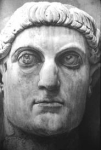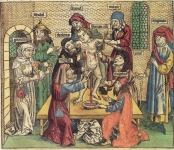|
|
 Constantine |
 Blood Libel Illustration |
|||||||||||||||
|
By Daniel Gruber Christian Anti-Semitism, by Daniel Gruber, is a series of articles that examines the historical development of the anti-Semitism that has proceeded from the church. This reader, for one, has found the series very informative, and select articles from it are being presented that the reader may gain similar benefit. The studies are being presented in the sequence in which their historical content occurred. Therefore, it is recommended that they be read in the sequence in which links to them are found in our Library. Most articles in the series highlight the origins of anti-Semitism in the Eastern and Catholic branches of the church. The article presented below, and the one just prior to it, brings to light the fact that the Protestant branch of the church does not get off Scott free. A significant portion of it carried forward the anti-Semitism it inherited from the Catholic church and reaped a bountiful "harvest" in the Holocaust.
In 1 Corinthians 14:15, Paul said,
I will pray with the spirit, and I will
pray with the understanding also (ASV). It is the prayer of
the Shofar board that the reader may grow in understanding in this
matter and pray accordingly. ~ editor
Study 10: LUTHER:
THEOLOGIAN OF THE HOLOCAUST
Martin Luther's anti-Semitism has often been treated as though it were a personal weakness or aberration from which he suffered in his later years. That is incorrect on two counts. First, he was an advocate of hatred from the beginning. Second, his anti-Semitism is built into his theology.
He hated the Jews of the Bible as much as he
hated the Jews of his own day. His theology justified and invited
the Holocaust. He can accurately be called the "Theologian of the
Holocaust."
Luther desired that Jews 'convert and become Christians,' yet he recognized that the Church was the greatest obstacle to that happening. In a pamphlet entitled "Jesus Christ was Born a Jew," Luther stated,
Yeshua said, By your words you will be justified, and by your words you will be condemned. (Matt. 12:37) Luther himself, in his own abusive insults and curses directed at the Jewish people and in his appeals for their destruction, far surpassed those whom he criticized. There is no one who exceeded him in this regard. His anti-Semitism did not begin later in his life. He expressed it from the beginning. His "compassionate" remarks were merely a device to strengthen his attacks on the papacy. His "Commentary on Romans" is considered one of the most influential books of all time. It formed a major part of the foundation on which the Reformation was built. It was written from sermons which Luther delivered in 1515-1516, a year or two before he nailed "The Ninety-five Theses" to the Wittenberg church door. Much of Romans speaks of the continuing role of the Jewish people in God's plan of redemption for the world. Luther responds to this factual reality in basically two ways: he says nothing or he greatly distorts the text to say something derogatory. A few of his comments on Romans 11 show how he handles the Biblical text. Paul begins the chapter by affirming God's faithfulness despite Israel's sin. I say then: Did God reject his people? By no means! I am an Israelite myself, a descendant of Abraham, from the tribe of Benjamin. God did not reject His people, whom he foreknew... (vv. 1-2). Luther comments:
The Jews didn't assume that they were God's people. God repeatedly told them they were. As the Lord told Moses, So now, go. I am sending you to Pharaoh to bring My people the Israelites out of Egypt (Exod. 3:10). As Moses told Israel, For you are a holy people to the Lord your God; the Lord your God has chosen you to be a people for His own possession out of all the peoples who are on the face of the earth (Deut. 7:6). Towards the end of Romans chapter 11, Paul explains how the blindness of part of Israel to the good news is only temporary. It is a means to open the door for Gentiles to be saved too. God will put an end to that blindness, because, On the one hand, they are hostile towards the good news for your sake. But concerning God's choice, they are beloved for the sake of the fathers (v. 27). Luther comments:
Verse 28 says, ...but from the standpoint of God's choice they are beloved for the sake of the fathers. The they who are beloved are the same people, the same they, who were yet opposed to the good news. In other words, God still loves those Jews who do not believe because of His love for their fathers.
Luther's treatment of the text is unbelievable.
Paul says that God loves them. Luther says the meaning of that is
that God hates them. For Luther, the meaning is not only that God
hates them, but also that Paul hates them. To the contrary, Paul was
willing to be damned forever for the salvation of his unbelieving
brethren. Not only, according to Luther, do God and Paul hate them,
but so do the other "Apostles and all who are of God." According to
Luther, someone who does not hate the unbelieving Jews is not of
God. Paul and What Luther writes is not interpretation. These are not comments on what Paul wrote. They are comments in spite of what Paul wrote. They are comments in defiance of what Paul wrote. This "Commentary on Romans" is his foundational theological work. Luther said these things before the Reformation even began. He built his theology and life on this distortion and hatred. Martin Luther's anti-Semitism is built into his theology from the beginning. It is integral to his view of salvation by faith without works. For Luther, good works are what the rejected Jews presented to God. It is warp and woof of his teachings against the Law. He taught that Moses and everything Jewish had to vanish. It is the reason for his denial of the Millennial reign of Messiah on the earth. A millennial kingdom meant that the God of Israel was still faithful to His people. Luther would not accept that. In Gen. 12:3, God promises Abraham I will bless those who bless you, and whoever curses you I will curse; and all peoples on earth will be blessed through you. God later repeats this promise to all Israel. In his "Works," Luther comments on Gen. 12:3. He sums up the situation of the Jews somewhat strangely:
Are these the comments of a man who lets the Scriptures determine his theology? Do Jews need "to invent some idea about God's mercy and goodness"? Isn't God merciful and good? For that matter, does anyone, including Luther, have any hope for salvation outside the reality of God's mercy and goodness? Neither the hatred nor the system of "interpretation" were original with Luther. But he created a theology which placed the destruction of the Jews in a favorable light. In this way, Luther became the theologian of the Holocaust.
Inviting the Holocaust
Luther adamantly maintained that,
Luther did not stop with writing off the Jews. He took his followers beyond that.
After slandering the Jews and presenting them as an object of contempt, Luther taught his followers the first step of his solution:
He attributed his curses and judgments on the Jews to the Lord.
It should be kept in mind that Luther did not hate only Jews. He also hated the Catholics, the Muslims, and other reformers. His response to the Peasant's Revolt was hatred of the peasants. He embraced the Imperial Church of Augustine and exalted the secular power. In 1648, the Treaty of Westphalia, following Augustine and Luther, codified the principle that "The religion of the prince is the religion of the people." One's religion was determined by one's civil ruler. Dissent was rebellion. Gone was Biblical faith. Luther called for the destruction of the rebels, i.e. those he hated.
Why were these Luther's heroes of Christian history? Constantine? the pagan pontifex maximus who conquered the Church with the sword, brought multitudes of unbelievers into it, and authorized the execution of all believers who wouldn't submit to his adulterations? Luther claimed that only the State could license ministers of the Church. If any man presumed to preach or teach without being licensed by the State,
These were not idle words. They were carried out.
"[T]hey took the Anabaptists to the torture chamber. We read: '...he
was thrice Luther had early seen quite clearly the nature of the system he was advocating. "The Pope hath... mixed and confounded matters ecclesiastical and political together; which is a devilish and hellish confusion." 17 The goal for Luther was to use that "devilish and hellish" mixture to eliminate the Jews completely.
If you remove Luther's distortion of the Biblical text and his rejection and hatred of the Jews, his theology disintegrates. His theology comes from his anti-Semitism. They cannot be separated. Some of Luther's supporters treat his anti-Semitism as though it were an aberration to be overlooked. They look at his role in the Reformation and his theological contributions as though they outweighed his sins. They seem to think that he was saved by his good works. It is not, however, evident that his works or his theology were good. Did Hitler do anything that Luther did not recommend? Hitler said, "I believe that I am today acting according to the purposes of the Almighty Creator. In resisting the Jew, I am fighting the Lord's battle."
Hitler was never excommunicated by the Roman
Catholic Church. Apparently he did nothing that it thought deserved
excommunication. The same must be said of the Lutheran Church and
the Nazis who remained Lutherans in good standing. Had their deeds
been totally unacceptable, they would have been excommunicated. FOOTNOTES
1. Commentary on Romans, Martin Luther,
Translated by J. Theodore Mueller, Kregel Publications, Grand
Rapids, MI, 1976, P.160.
~
|
|||||||||||||||||

